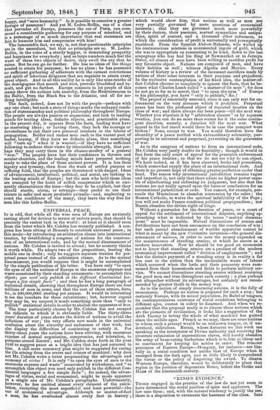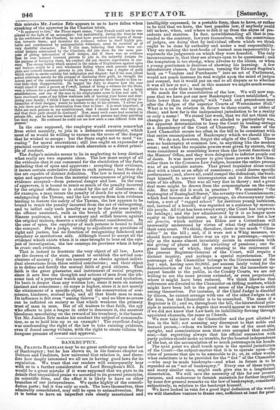"KING'S EVIDENCE."
THOSE engaged in the practice of the law do not yet seem to have determined the moral position of spies and approvers. The law uses them ; and, with the natural tendency to justify the use, there is a disposition to extenuate the baseness of the class. Into
this mistake Mr. Justice Erie appears to us to have fallen when speaking of the approver in the Chartist trials. "It appeared to him," the Times report states, "that Powell could not be con- sidered in the light of an accomplice: but undoubtedly, during the time he was in the confidence of the Chartists, he mast have practised some degree of decep- tion towards them; and therefore his evidence, unless in itself highly pro- bable and corroborated by unimpeachable witnesses, must be received as of very doubtful character. But if this man, believing that there were cri- minal designs entertained by the Chartists, did join them for the mere. pur- pose of giving information of their designs., .and if there was no evidence that he ever induced innocent his to join in the unlawful designs for the purpose of betraying them, his conduct did not deserve reprobation or cen- sure. The strong feeling which existed in the minds of Englishmen against spies and traitors might be a very wholesome feeling where such persons fomented plots and induced innocent persons to join them. This was a degree of guilt which ought to excite nothing but indignation and disgust: but if the man joined actual criminals merely for the purpose of disclosing their guilt, he thought the honest part of the community would be ready to express their thanks to him ra- ther than their disapprobation. He begged the Jury to observe how the case would stand if such a person as Powell, instead of being a witness for the State, were a witness for a private individual. Suppose any of the jurors had a large establishment, and one of the men in his employment come to him and said, I have overheard some of my fellow workmen Wk of burning your house and mur- deringyour family; I think I have an opportunity of joining them and giving in- formation of their designs,' would he hesitate to say to his servant, 'I advise you to join them and give me information from time to time: it is most important, if there are such persons in my establishment, that I should know who they are, and that their guilt should be disclosed.' Now, many such cases had occurred in private life; and he had never heard it said that such persons had done anything but their duty. He confessed he could not see how such a case differed from the present."
In the case supposed, the employer would swerve somewhat from strict morality, to join in a defensive counterplot, which most of us would be willing to excuse on the score of the danger that he wished to escape : but the State ought not to need " ex- cusing " for moral aberrations ; still less ought an expounder of practical morality to recognize such aberration as a direct princi- ple of conduct. The Judge's mistake seems to lie in neglecting to keep distinct what really are two separate ideas. The law must accept of all the evidence that it can command for the elucidation of the facts, including that of spies and approvers : accepting their evidence, it incurs certain correlative duties to such persons ; but those du- ties are capable of distinct definition. The law is bound to shield spies and approvers from the material consequences of giving the evidence accepted—from personal danger and loss. In the case of approvers, it is bound to remit so much of the penalty incurred by the original offence as is atoned by the act of disclosure : if, for example, a man incurs the penalty of death for acts of treason endangering the Throne, and the law accepts from him evidence tending to restore the safety of the Throne, the law appears to be bound to remit the penalty incurred from the act of endangering, and to inflict only such penalty as may be due for some part of the offence unatoned, such as the breach of public morality. Sincere penitence, and a mercenary and selfish treason against the original traitors, deserve a widely different consideration. In the case of spies, the employer of such persons is bound to fulfil the compact. But a judge, sitting to adjudicate on questions of right and justice, has no function of recognizing falsehood and treachery as meritorious aids. Although bound to accept all the evidence which exists when it is once brought to bear on the sub- ject of investigation, the law outsteps its province when it helps to create such evidence.
That is indeed to frustrate the very object of all law. Laws are the decrees of the state, passed to establish the settled con- clusions of society ; they are necessary as checks against indivi- dual aberrations from those settled conclusions ; and their object is to define and fortify the mutual faith of good citizens. That faith is the great guarantee and instrument of social progress, since it sets free the thoughts and actions of men from the irk- some task of a perpetual watch against aggression and spoliation. Its basis is deeper than any written law, since it rests on natural instinct and conscience ; its scope is higher, since it is not merely the attainment of a specific object, but the conservation of con- science, kindness, mutual help, and all that binds man to man. Its influence is felt even "among thieves " ; and no blow so severe can be inflicted on society as that which weakens the primary trust of man in man. But of all traitors to that faith, the spy
who affects to join a league in order to denounce it, the amateur
bloodman speculating on the reward of his treachery, is the basest. Yet Mr. Justice Erie makes his conduct the subject of commenda- tion, so as to hold him up as an example ! The excellent Judge was confounding the right of the law to take existing evidence, even if found among villains, with the right to create villains by foregone promise of reward and approval.



























 Previous page
Previous page